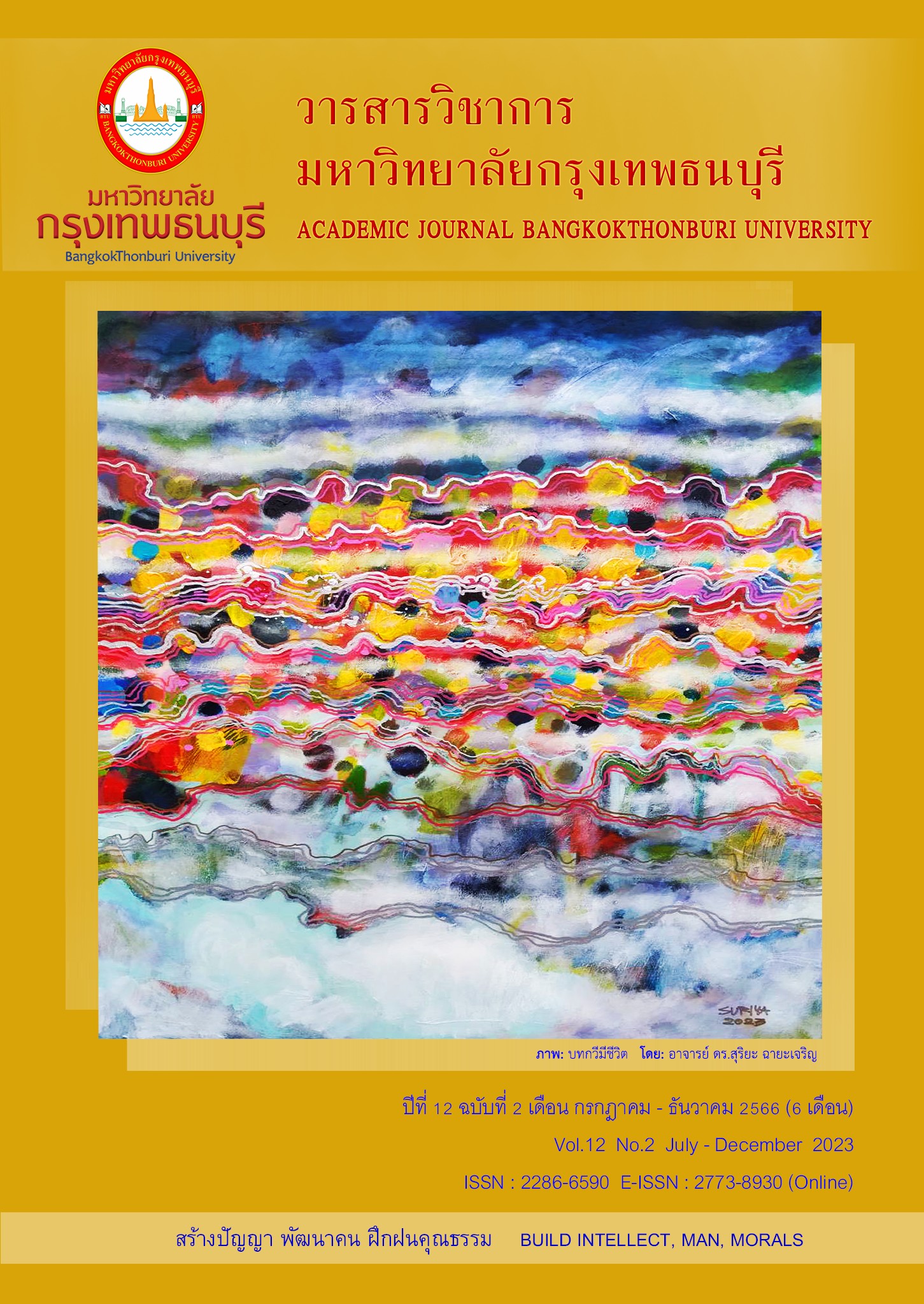An Empirical Study of Digital Innovation Literacy Skills that Affect the Orientation and Benefits of Developing Appropriate Digital Innovation Literacy Skills of People in the Northeastern Region of Thailand
Main Article Content
Abstract
This research aimed to investigate personal factors and media consumption behaviors' impact on digital literacy skills and to explore strategies for developing appropriate digital literacy skills among the population in the Northeastern region of Thailand. The study involved a sample of 400 individuals aged 18 and above from the Northeastern region and employed surveys and interviews as data collection tools. Statistical analysis techniques, including percentages, averages, standard deviations, t-tests, and one-way ANOVA, were used for data analysis. The study revealed the following key findings: 1) Personal factors, specifically age and province, significantly influenced the digital literacy skills of the population in the Northeastern region of Thailand. 2) Different media consumption behaviors did not have a significant impact on digital literacy skills in the same population, and 3) The recommended strategies for enhancing digital literacy skills in this region include increasing the use of digital technology in daily life and work through online training. This could create new job opportunities and additional income streams in digital-related fields, benefiting the population in seeking employment and increasing their income. Additionally, the promotion of lifelong learning and adaptability to technological changes is essential for effective digital technology utilization in various aspects of life in the Northeastern region.
Article Details

This work is licensed under a Creative Commons Attribution-NonCommercial-NoDerivatives 4.0 International License.
References
กรรณทิมา อิสระโชติ. (2565). การพัฒนาหลักสูตรฝึกอบรมเพื่อเสริมสร้างทักษะการรู้เท่าทันสื่อสำหรับนักเรียนชั้นมัธยมศึกษาตอนปลาย โรงเรียนธรรมโฆสิต. สงขลา: มหาวิทยาลัยหาดใหญ่.
จุฑามาศ ฉัตรสุริยาวงศ์. (2564). พฤติกรรมการเปิดรับสื่อสังคมออนไลน์กับการรู้เท่าทันสื่อของนักศึกษาในเขตกรุงเทพมหานคร. กรุงเทพฯ: มหาวิทยาลัยธรรมศาสตร์.
ชบา โพธิ์มณี. (2563). การศึกษาเชิงประจักษ์ด้านทักษะการรู้เท่าทันนวัตกรรมดิจิทัลของข้าราชการทหารอากาศ. ปทุมธานี: มหาวิทยาลัยรังสิต.
ชัชชญา เรืองยศ. (2563). การรู้เท่าทันสื่อสังคมออนไลน์ของผู้สูงวัย. กรุงเทพฯ: มหาวิทยาลัยธรรมศาสตร์.
ณัฏฐ์ ฐนันท์รมย์. (2562). การเปิดรับ การรู้เท่าทัน และผลกระทบจากการใช้สื่อออนไลน์ของเยาวชนจังหวัดปัตตานี. นนทบุรี: มหาวิทยาลัยสุโขทัยธรรมาธิราช.
ณัฏฐกาญจน์ ศุกลรัตนเมธี และนุชประภา โมกข์ศาสตร์. (2562). การรู้เท่าทันสื่อสังคมออนไลน์ของเยาวชนเพื่อการเป็นพลเมืองในสังคมประชาธิปไตย. กรุงเทพฯ: สำนักวิจัยและพัฒนา สถาบันพระปกเกล้า.
ทวีสิน อำนวยพันธ์วิไล. (2564). การพัฒนารูปแบบการจัดการเรียนรู้บนระบบคลาวด์ด้วยการเรียนรู้แบบร่วมมือรวมพลังร่วมกับการคิดเชิงวิพากษ์เพื่อส่งเสริมการรู้เท่าทันสื่อดิจิทัลของนักเรียนระดับมัธยมศึกษา. พิษณุโลก: มหาวิทยาลัยนเรศวร.
ธนาพันธ์ ชัยเทพ. (2563). การศึกษาการรู้เท่าทันสื่อของนักศึกษาระดับอุดมศึกษาในเขตภาคเหนือ. พิษณุโลก: มหาวิทยาลัยนเรศวร.
นภาวัลย์ ภัทราธิกุล. (2565). การพัฒนาชุดฝึกอบรมเสริมสร้างสมรรถนะการรู้เท่าทันสื่อสารสนเทศและดิจิทัลแบบบูรณาการ อิสลามเพื่อป้องกันการรังแกในโลกไซเบอร์สำหรับครูมัธยมศึกษาในจังหวัดปัตตานี. สงขลา: มหาวิทยาลัยสงขลานครินทร์.
ไพโรจน์ ทิพมาตร์. (2562). ปัจจัยส่วนบุคคลและส่วนประสมทางการตลาดที่มีผลต่อการตัดสินใจเลือกบ้านพักคนชราของผู้สูงอายุ. กรุงเทพฯ: มหาวิทยาลัยเทคโนโลยีราชมงคลพระนคร.
ภาษิตา ชัยศิลปิน. (2563). การพัฒนารูปแบบการสอนโดยบูรณาการเว็บเควสต์ร่วมกับการใช้ 5 คำถามหลักของการรู้เท่าทันสื่อสังคมเพื่อส่งเสริมความสามารถในการอ่านอย่างมีวิจารณญาณและการเขียนให้เหตุผลของนักเรียนระดับมัธยมศึกษา. พระนครศรีอยุธยา: จุฬาลงกรณ์มหาวิทยาลัย.
สิริกานต์ เทพสอน. (2564). การสร้างแบบวัดทักษะการรู้เท่าทันสื่อสำหรับนักเรียนชั้นมัธยมศึกษาปีที่ 4 สังกัดสำนักงานเขตพื้นที่การศึกษามัธยมศึกษาสกลนคร. มหาสารคาม: มหาวิทยาลัยมหาสารคาม.
Yamane, T. (1973). Statistics: An introductory analysis. New York: Harper &row.


